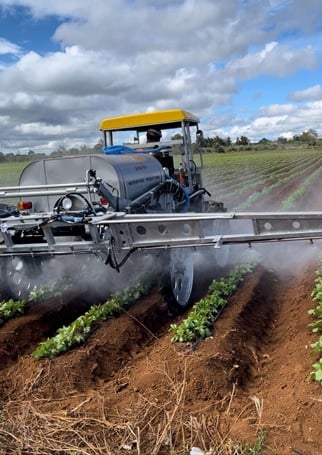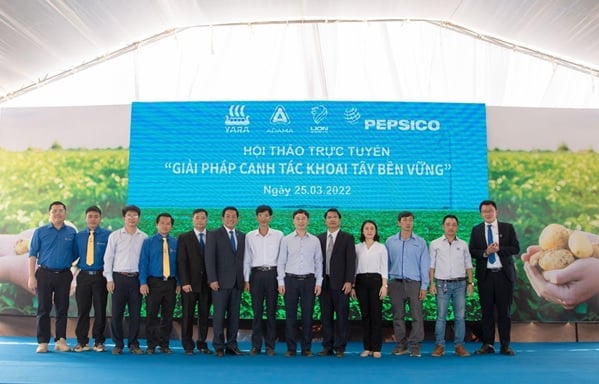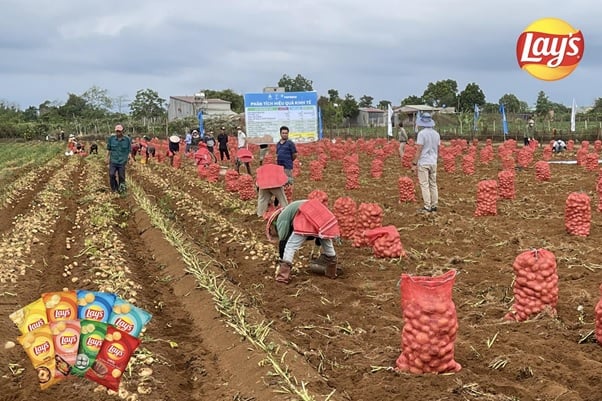November 28, 2025 | 01:29 GMT +7
November 28, 2025 | 01:29 GMT +7
Hotline: 0913.378.918
November 28, 2025 | 01:29 GMT +7
Hotline: 0913.378.918
Our commitment aims to progressively improve agroecosystems through holistic practices and create a regenerative value creation.
Specific to our pep+ (PepsiCo positive) agenda, PepsiCo Vietnam co-organized an onsite training workshop on "Sustainable potato farming solutions" with its partners ADAMA and Lion Agrevo on March 25, 2022. The training attracted more than 200 farmers, and was also attended by Lam Dong Potato, Vegetable and Flower Research Center, Western Highland Agriculture and Forestry Science Institute. Through such activities and more, we aim to drive actions that will be able to create a systemic shift to build long-term resilience, generate business and economic opportunities and provide environmental and societal benefits to the communities in the highlands of Vietnam.
Mr. Nguyen Kim Hanh, Agro Head of PepsiCo, Vietnam said, “ for many years now, the company has continued to accompany farmers in Lam Dong province to conduct research on soil and climate and support them with innovation to increase the supply of high quality potatoes in the country”.
Investment in innovative agricultural solutions is already showing great results. PepsiCo Vietnam is focusing on improving quality in sustainable potato production by using regenerative agricultural practices by using new varieties, irrigation methodologies such as drip and sprinkler systems to reduced 30% total water using, integrated pest management, fixed fertilizer solution, mechanization from land preparation until harvesting. As a result, potato yield has increased by 300%, from 8 tons/ha to 25 tons/ha and is expected to reach 30 tons/ha in the coming years.

Mechanization of watering process.
PepsiCo Vietnam and its partners have deployed technology to assist farmers in the famous potato growing regions across the country to help them manage pests and diseases through high-tech scientific and technical solutions. This mechanization of the potato production process also means bettering the lives of people in the agricultural supply chain.
The workshop demonstrated and elaborated on sustainable farming practices through Mr. Mai Ngoc Dung’s potato field (with an area of nearly 15 hectares) located in La Bang commune, Chu Prong district in Gia Lai province. He had planted potatoes on December 6th 2021 and by the end of the season, the yield was about 29 tons/ha, much higher than his previous yields.
In fact, the climate and soil in Gia Lai most suitable for growing potato plants. With a daytime temperature of about 22-25 degrees Celsius and 16-18 degrees Celsius at night along with the loose basalt red soil, Gia lai is the ideal location for growing the potato variety FL2215. With the initial success of this model, Gia Lai promises to become the main source of supplying potatoes for the whole country.
“Besides the natural factors, scientific solutions such as irrigation management, soil selection, cultivating single bed farming have contributed significantly to increase economic efficiency and reduce production costs for farmers”, shared Mr. Nguyen Hong Hang – Agro Project Manager of PepsiCo Vietnam
The cooperation and understanding between PepsiCo Vietnam and its partners is an important step in promoting sustainable potato production and increasing the domestic potatoes usage in food processing activities. The potato products from the country not only meet the domestic standards but also international.
Adama, one of PepsiCo’s partner in the country is responsible for researching and supplying bio-protective products to control nematodes, wilt and mildew to the farmers. In fact, the farmers actually noticed a decrease in the rate of pests and diseases compared to the control field.

Representatives of units coordinated to organize the conference.
In addition, another PepsiCo Vietnam partner, Lion Agrevo, reiterated its commitment to provide the best solutions and products for Vietnamese growers.
In order to get high-quality international products to consumers, PepsiCo is constantly researching and experimenting to create a more sustainable food ecosystem.

Winning consumers' trust through the national potato fields.
We currently hold the leadership position with Lay’s as the world’s largest food brand. We want to continue selling the best tasting potato chips in the market, in a way that keeps our promise to the consumer. We believe that the key to Lay’s success is the quality of the potatoes, grown sustainabily on a regenerative field in the country. By delivering superior products, PepsiCo Vietnam aims to educate, appeal and inspire diverse cohorts of consumers to take positive actions and make better choices for themselves and the planet.

(VAN) According to Mr. Vo Minh Thanh, Director of the Tay Ninh Department of Agriculture and Environment, Resolution 57 has created a new development pathway for the locality, shifting from traditional toward modern agriculture.
/2025/11/26/4909-2-154329_878.jpg)
(VAN) Pearl grouper farming in HDPE cages not only delivers economic efficiency but also contributes to protecting the environment, creating jobs, and promoting marine-based experiential tourism.

(VAN) The model of making a living under the forest canopy through the agroforestry system in Van Son commune, Bac Ninh province, is expected to generate an annual income of approximately VND 30 million/ha.

(VAN) Many enterprises in Can Tho are harnessing natural energy and reducing greenhouse gas emissions in their production processes, thereby contributing to the promotion of a sustainable green transition.
/2025/11/24/3536-2-112800_176.jpg)
(VAN) Dong Nai now has tens of thousands of hectares of forests certified for sustainable management, and this area will continue to be expanded in the coming period.

(VAN) Vinh Ha hamlet (Dai Xuyen commune, Hanoi) is shifting away from small-scale farming as households adopt bioscurity into their breeder chicken models.

(VAN) Heavy rains make aquatic species more vulnerable to disease. Proactive water management and high-tech systems help farmers prevent outbreaks and protect yields.